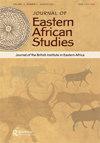‘The outcome of a historical process set in motion in 1991’: explaining the failure of incumbency advantage in Zambia’s 2021 election
IF 0.6
3区 社会学
Q2 AREA STUDIES
引用次数: 2
Abstract
ABSTRACT This article uses a longitudinal comparative perspective to analyse Zambia's 2021 transfer of power. The article takes the previous elections since the transition to multi-party democracy in 1991 as a body in which patterns of incumbency failure can be seen. It identifies five pervasive patterns that seem present in all polls that have resulted in leadership change or turnovers: a struggling economy with a clear blame orientation, a unified opposition, a depoliticised military, a rather impartial electoral commission, and collective memory of incumbent defeat. The importance of each of these factors varies over time, but collectively they shape election outcomes in decisive ways. Drawing on interviews and newspaper sources, I apply these variables to the 2021 election that resulted in the defeat of President Edgar Lungu and the victory of the opposition candidate. I argue that the repeated failure of incumbency advantage in Zambia reflects the institutionalisation of democratic processes, notably embodied in competitive elections, an increasingly independent electoral commission, effective opposition parties that can devise robust campaign strategies, and a military that continues to choose non- intervention whenever an incumbent is defeated. More broadly, I demonstrate why alternation is becoming routine while the power of incumbency is in decline.“1991年启动的历史进程的结果”:解释赞比亚2021年选举中在职优势的失败
本文采用纵向比较的视角来分析赞比亚2021年的权力转移。这篇文章把1991年向多党民主过渡以来的历次选举作为一个整体,从中可以看出在任者失败的模式。它指出了五种普遍的模式,这些模式似乎出现在所有导致领导层更迭或更替的民意调查中:经济陷入困境,明确的指责导向,统一的反对派,非政治化的军队,相当公正的选举委员会,以及对现任者失败的集体记忆。这些因素的重要性随着时间的推移而变化,但总的来说,它们以决定性的方式影响着选举结果。根据采访和报纸资料,我将这些变量应用于2021年的选举,结果是总统埃德加·伦古(Edgar Lungu)失败,反对派候选人获胜。我认为,在任者优势在赞比亚的一再失败反映了民主进程的制度化,特别是体现在竞争性选举、日益独立的选举委员会、能够制定强有力的竞选策略的有效反对党,以及在任者被击败时继续选择不干预的军队。更广泛地说,我论证了为什么交替正在成为惯例,而在任者的权力正在下降。
本文章由计算机程序翻译,如有差异,请以英文原文为准。
求助全文
约1分钟内获得全文
求助全文
来源期刊

Journal of Eastern African Studies
AREA STUDIES-
CiteScore
3.30
自引率
7.10%
发文量
12
期刊介绍:
Journal of Eastern African Studies is an international publication of the British Institute in Eastern Africa, published four times each year. It aims to promote fresh scholarly enquiry on the region from within the humanities and the social sciences, and to encourage work that communicates across disciplinary boundaries. It seeks to foster inter-disciplinary analysis, strong comparative perspectives, and research employing the most significant theoretical or methodological approaches for the region.
 求助内容:
求助内容: 应助结果提醒方式:
应助结果提醒方式:


